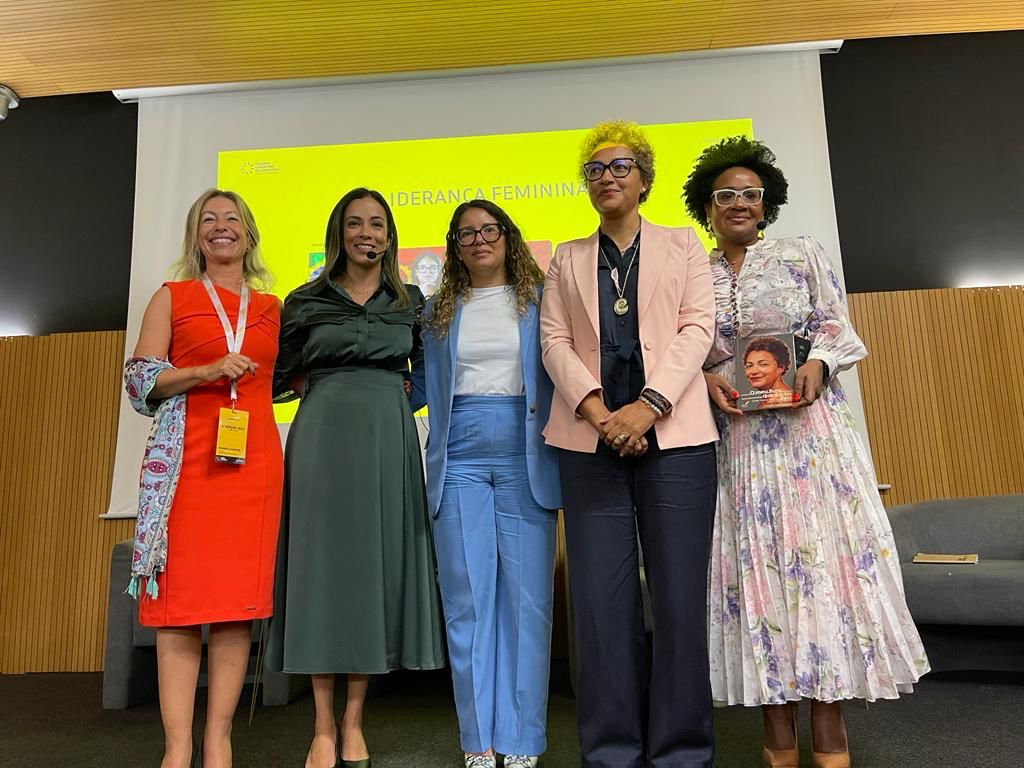6 Steps to Challenge the Status Quo and Alleviate Female Leadership’s Invisible Barriers

Halfway to 2030, the world is failing women and girls. We are far or very far from the 2030 targets. Deeply rooted biases against women, manifesting in unequal political representation, economic disparities and a lack of legal protection, among other issues, prevent tangible progress.
Addressing institutional barriers, including through removing discriminatory
Progress on the Sustainable Development Goals: The gender snapshot 2023- UN Women
laws, expanding women’s participation in leadership and decision-making and right-sizing
investments in gender equality at the national, regional and global levels, are among the
concrete actions needed to substantially accelerate progress by 2030.
In a powerful and inspiring gathering at the Lusophone Leadership Summit on October 5, 2023, the spotlight shone brightly on Female Leadership. The event, graced by the presence of President Anabela Chastre, brought together remarkable women from various fields who have shattered ceilings and paved the way for a new era of leadership. Yonne de Castro, Standard Bank Administrator, Camila Leite, Business & Marketing Director at Multitel and Angola Country Chair G100Money Mindset & Wealth Creation, and Sofia Chaves, President of PWN Angola and CEO of Imcuba Angola, joined forces to discuss the challenges and opportunities surrounding female leadership.

The Invisible Barriers: Social Conditioning
Many women face resistance and scepticism when they aspire to leadership roles. One of the first obstacles discussed was the lack of support from organisations, society, and even family. The haunting spectre of self-doubt also reared its head, with women questioning their own worthiness for leadership positions.
Culture and social conditioning are playing a crucial role in shaping our views on gender roles and female leadership. The participants stressed the importance of educating both sons and daughters to believe that they can pursue any profession or leadership position they desire. Leading by example was deemed essential in challenging and changing traditional norms.
Speakers expressed their concern for the lack of training and mentorship for women in leadership positions. Providing women with the skills and guidance necessary to thrive in leadership roles was a recurring theme and it was agreed that this is a vital step towards breaking through the barriers they face.
Unveiling the Challenges faced by Female Leaders
The challenges faced by female leaders, not only within the Lusophone community but worldwide, were laid bare. These challenges include:
Gender Discrimination: Women frequently encounter gender-based discrimination, which often hampers their ascent to leadership roles.
Wage Gap: The persistent wage gap between men and women remains a prevalent issue, hampering women’s leadership opportunities.
Gender Stereotypes: Traditional gender stereotypes continue to limit expectations regarding women as leaders.
Access to Education and Training: In some regions, women’s access to education and leadership training remains limited, hindering their professional growth.
Lack of Representation: A dearth of female representation in leadership positions perpetuates a cycle of underrepresentation, providing fewer role models for aspiring women leaders.
Work-Family Balance: Balancing family responsibilities with demanding leadership careers poses a unique challenge for women.
Organisational Culture: Some workplaces maintain cultures that are not inclusive for women, further intensifying barriers.
A Stark Reality Check The sobering reality is that despite our collective efforts, progress towards gender equality remains slow. The United Nations reports reveal a disheartening forecast: full gender equality may not be realised until 300 years from now, according to the UN Women report in collaboration with the UN Department of Economic and Social Affairs (DESA) titled “Progress on the Sustainable Development Goals: The Gender Snapshot 2022.”
Three centuries is an agonisingly long wait for something as basic as gender equality. Can we afford to be disheartened?

Challenge the Status Quo: Activate Your Self- Leadership
The path to change begins with introspection. We must examine our biases, the impact of our education, and how these factors shape our views on female leadership. Are we comfortable with the status quo, or does it make us uneasy? Identifying what either uplifts or hinders female leadership is the first step in making a change.
The power of female leadership is immense, but it remains constrained by invisible barriers. To break through, we must start with ourselves, recognize our potential, and challenge the status quo. Let’s not wait 300 years for gender equality; let’s make it happen today. Trust yourself, let your power flow, build your awareness, and act as the leader you were born to be. It is time to change the way you see yourself and your role in the world.
How to Overcome the Challenges Female Leaders are Facing
The workplace, once considered a predominantly male domain, has gradually transformed into a more inclusive environment. However, women still face numerous challenges on their journey towards equality in the workforce. These challenges, though persistent, are not insurmountable. Here, we explore five key hurdles women encounter in the workplace and offer strategies to overcome them.
Balancing Work and Family Responsibilities
One of the most prevalent challenges for working women is striking a balance between their professional and family lives. Juggling career ambitions with caregiving responsibilities can be overwhelming. To address this issue:
- Flexible Work Arrangements: Advocate for flexible work arrangements, such as remote work or flexible hours, to better accommodate family needs.
- Shared Responsibility: Encourage open discussions with partners and family members to share caregiving responsibilities more evenly.
- Supportive Employers: Seek out employers who prioritise work-life balance and offer family-friendly policies.
Gender Bias and Stereotyping in the Workplace
Gender bias and stereotypes still persist in many workplaces, affecting career opportunities and decision-making. To combat these biases:
- Raise Awareness: Create awareness about gender biases and stereotypes by fostering open conversations in the workplace.
- Mentorship and Sponsorship: Seek mentors and sponsors who can help navigate workplace challenges and advocate for career advancement.
- Challenge Stereotypes: Challenge stereotypes by proving your capabilities through exceptional performance and leadership.
Breaking the Glass Ceiling
The “glass ceiling” represents an invisible barrier that prevents women from reaching the highest echelons of leadership. To shatter this barrier:
- Professional Development: Invest in continuous learning, skill development, and leadership training to enhance your qualifications.
- Networking: Build a strong professional network, both within and outside your organisation, to expand your opportunities.
- Advocate for Yourself: Don’t hesitate to express your career aspirations and negotiate for promotions or leadership roles.
Overcoming Self-Doubt
Self-doubt can plague even the most accomplished women in the workplace.
Lack of confidence often plagues female leaders. Doubts about our abilities and worthiness for promotions can hold us back. It’s essential to remember that every step you’ve taken in your journey is a testament to your strength and capability. There are steps you can take to conquer self-doubt:
- Acknowledge Achievements: Recognize your accomplishments and the value you bring to your organisation.
- Seek Feedback: Request constructive feedback from mentors, colleagues, and supervisors to validate your skills.
- Mindfulness and Self-Care: Practice mindfulness and self-care techniques to boost self-confidence.
Navigating Office Politics
Navigating the complex world of office politics can be particularly challenging for women. To navigate office politics effectively:
- Build Alliances: Forge strong relationships with colleagues and supervisors to create allies who can support your career growth.
- Stay Informed: Stay informed about the dynamics of your workplace and industry to make informed decisions.
- Maintain Professionalism: Avoid getting entangled in negative politics and focus on your professional goals and integrity.
While these challenges persist, the tide is turning as more organisations recognize the importance of gender diversity and inclusivity. As women continue to break barriers, support each other, and challenge stereotypes, the workplace becomes more equitable for everyone. By empowering themselves and advocating for change, women can overcome these challenges and contribute their unique perspectives to the business world, fostering a more inclusive and successful future for all.
Breaking Cultural Chains
Cultural expectations can be suffocating, dictating that women should stick to caregiving roles and not aspire to leadership. It’s time to break free from these chains and create the conditions for leadership:
- Build a support network to help you navigate the challenges of balancing personal and professional life.
- Empower yourself by seeking knowledge and guidance from mentors and coaches.
- Accept leadership challenges, staying true to your identity as a woman.
- Voice your opinions and let your ideas be heard; your voice matters.
- Embrace your uniqueness; it sets you apart.
- Share your leadership experiences; you might be a role model for someone without even realising it.
Talking about female leadership is always challenging because we live first-hand these challenges. Yet, keeping the conversation going, passing on our experience so that other women and girls feel inspired and believe makes it possible to attain a leadership position that is both a challenge and a tremendous responsibility.
Do you want to share your story and inspire our readers ? Know that every story is paving the way for a brighter, happier future.




